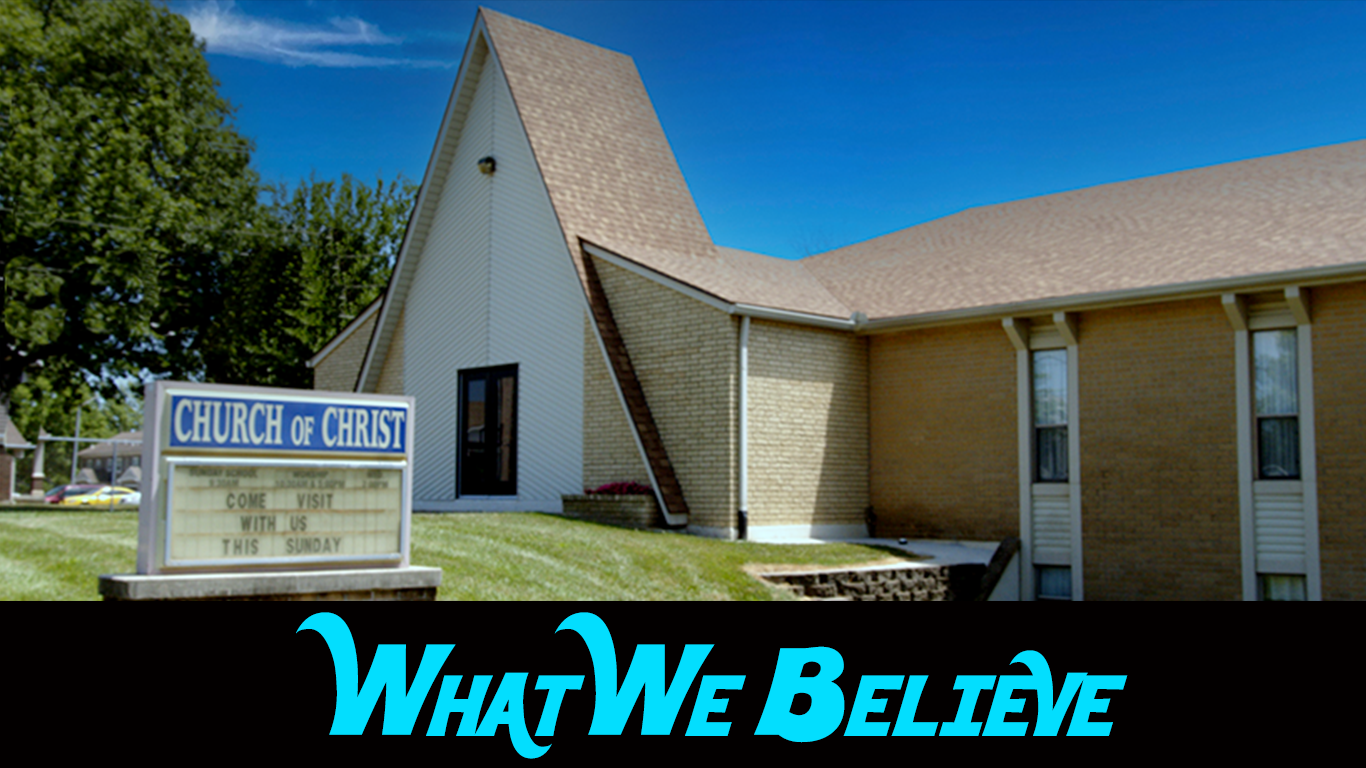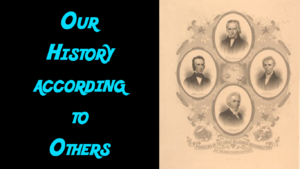What We Believe About:
God: God is the Creator of all things (Genesis 1:1; Acts 17:24) and is known in the New Testament as God the Father (Galatians 4:6; Ephesians 1:3; 4:6; James 1:17). We believe that He is one of the members of the Godhead (Matthew 28:19; 2 Corinthians 13:14) and that He is the orchestrator of salvation’s wondrous plan (Ephesians 3:9-11).
Jesus: Known as the Word in John 1:1, the Word became flesh (John 1:14) and became the Son (Hebrews 1:4-5) to save man from their sins (John 3:16). This Word, also known as Jesus while on earth (Matthew 1:21), was also the Creator of all things (Genesis 1:1, 26; Colossians 1:16; Hebrews 1:2). He lived without sin (Hebrews 4:15; 1 Peter 2:22) and came to seek and save the lost (Luke 19:10). Throughout His ministry, He healed the sick, taught on various matters, and eventually, became the ultimate, one-time sacrifice for all of mankind (Hebrews 9:28; 1 John 2:2).
The Holy Spirit: He also had a part to play in Creation (Genesis 1:26) and is known as the Spirit of truth (John 16:13) and the Comforter (John 16:7). He inhabits all attributes of deity, because He is deity. He is not some mystical force or some “still small voice.” Instead, He is an actual person, with actual traits. He inspired men in the Old Testament to speak and write (2 Peter 1:20-21; 2 Timothy 3:16) and inspired men in the New Testament numerously to do the same thing. Through the Spirit, one was able to do miraculous deeds (1 Corinthians 12:9-11). The apostles and maybe even those in Acts 10 received the baptism of the Holy Spirit (Acts 2; 10). The apostles had the ability to pass on the miraculous gifts of the Spirit (Acts 8:14-17). Today, the Holy Spirit works through the Word of God (Ephesians 6:17). There is no need for the miraculous anymore, for the purpose of those is not needed (Mark 16:20; c.f. 1 Corinthians 13:10).
The church: Promised through the ages and produced in Acts chapter two, the church of Christ has been in the mind of God for eternity (Ephesians 3:10-11). The church is unique in that its’ place of beginning was promised (Isaiah 2), its time was planned (Daniel 2), and that it was built by Jesus Himself (Matthew 16:18). The church of Christ is not a man-made denomination, but is rather a body of believers who have chosen to accept and obey Christ (Galatians 3:26-27; Ephesians 1:4-7). The church of Christ wears a Scriptural name (Romans 16:16), submits to its Scriptural leader (Ephesians 1:22-23; Colossians 1:18), is united in doctrine (John 17:20-21; 1 Corinthians 1:10), and anyone wanting to be apart of this wonderful family, MUST be added by Jesus Himself, according to HIS terms (Acts 2:47). Any “church” that (1) wears a different name, (2) began before or after Acts 2, (3) submits to an authority other than the inspired Word of God, and (4) attributes a man to its beginning is NOT the one church found in the New Testament. As one person said, the church of Christ is that which belongs to Christ. Any other church not having these fundamental principles CANNOT be His wonderful bride (c.f. Ephesians 5:23-33; Revelation 19:7).
The Bible: One Bible student noted that the Bible was “written over a span of 1,600 years, across 3 continents, by 40 authors, in 3 languages, yet it has 1 theme.” The Bible is inspired of God (2 Timothy 3:16-17; 2 Peter 1:20-21). The Bible is inerrant (Psalms 19:7), all-sufficient, and plenarily inspired (2 Timothy 3:16). We can understand it (Ephesians 3:4) and it is truth because it is from God (John 17:17). It has the capability to save (James 1:21) and convict men of sin (Hebrews 4:12). With it, we can know how to be cleansed (Ephesians 5:26) and live godly, because we have everything we need inside it to do just that (2 Peter 1:3).
Salvation: Salvation can be divided into two parts: (1) Deity’s role and (2) Man’s role.
It is because of God’s love (John 3:16; Romans 5:8), mercy (Ephesians 2:4), and grace (Ephesians 2:5-9) that we can be saved. God is the architect of this wonderful plan (Ephesians 3:11). It is because of Jesus’ sacrifice that we can be saved (Hebrews 5:8-9). By willingly offering Himself (John 10:18), Jesus became the sacrifice mankind needed to save men from sins. John rightly said it when he said, “Behold the Lamb of God, which taketh away the sin of the world” (John 1:29). Jesus is the executor of this wonderful plan (John 6:38). It is through the Holy Spirit’s inspiration of certain men that mankind can know how to be saved. Through the Word we know how to be saved and can be born again (1 Peter 1:23). The Holy Spirit is the organizer of this wonderful plan (John 16:13).
Man must comply with God’s commands if he wants to go to heaven. If we love Jesus, we will obey His words (John 14:15). Jesus says that those who are born again may enter the kingdom of God (John 3:3, 5). If one wants to be saved, then he needs to hear the Gospel message (Romans 10:17), believe in Jesus (John 8:24), repent of sins (Acts 17:30), confessing Jesus’ name (Acts 8:37), and be willing to be baptized for remission of sins (Romans 6:3-4; 1 Peter 3:21). If one does these things, Christ will add him to the church (Acts 2:47). Continual adherence to the New Testament Scriptures is required for access into heaven (1 Timothy 6:12; Revelation 2:10).
What We Believe About:
God: God is the Creator of all things (Genesis 1:1; Acts 17:24) and is known in the New Testament as God the Father (Galatians 4:6; Ephesians 1:3; 4:6; James 1:17). We believe that He is one of the members of the Godhead (Matthew 28:19; 2 Corinthians 13:14) and that He is the orchestrator of salvation’s wondrous plan (Ephesians 3:9-11).
Jesus: Known as the Word in John 1:1, the Word became flesh (John 1:14) and became the Son (Hebrews 1:4-5) to save man from their sins (John 3:16). This Word, also known as Jesus while on earth (Matthew 1:21), was also the Creator of all things (Genesis 1:1, 26; Colossians 1:16; Hebrews 1:2). He lived without sin (Hebrews 4:15; 1 Peter 2:22) and came to seek and save the lost (Luke 19:10). Throughout His ministry, He healed the sick, taught on various matters, and eventually, became the ultimate, one-time sacrifice for all of mankind (Hebrews 9:28; 1 John 2:2).
The Holy Spirit: He also had a part to play in Creation (Genesis 1:26) and is known as the Spirit of truth (John 16:13) and the Comforter (John 16:7). He inhabits all attributes of deity, because He is deity. He is not some mystical force or some “still small voice.” Instead, He is an actual person, with actual traits. He inspired men in the Old Testament to speak and write (2 Peter 1:20-21; 2 Timothy 3:16) and inspired men in the New Testament numerously to do the same thing. Through the Spirit, one was able to do miraculous deeds (1 Corinthians 12:9-11). The apostles and maybe even those in Acts 10 received the baptism of the Holy Spirit (Acts 2; 10). The apostles had the ability to pass on the miraculous gifts of the Spirit (Acts 8:14-17). Today, the Holy Spirit works through the Word of God (Ephesians 6:17). There is no need for the miraculous anymore, for the purpose of those is not needed (Mark 16:20; c.f. 1 Corinthians 13:10).
The church: Promised through the ages and produced in Acts chapter two, the church of Christ has been in the mind of God for eternity (Ephesians 3:10-11). The church is unique in that its’ place of beginning was promised (Isaiah 2), its time was planned (Daniel 2), and that it was built by Jesus Himself (Matthew 16:18). The church of Christ is not a man-made denomination, but is rather a body of believers who have chosen to accept and obey Christ (Galatians 3:26-27; Ephesians 1:4-7). The church of Christ wears a Scriptural name (Romans 16:16), submits to its Scriptural leader (Ephesians 1:22-23; Colossians 1:18), is united in doctrine (John 17:20-21; 1 Corinthians 1:10), and anyone wanting to be apart of this wonderful family, MUST be added by Jesus Himself, according to HIS terms (Acts 2:47). Any “church” that (1) wears a different name, (2) began before or after Acts 2, (3) submits to an authority other than the inspired Word of God, and (4) attributes a man to its beginning is NOT the one church found in the New Testament. As one person said, the church of Christ is that which belongs to Christ. Any other church not having these fundamental principles CANNOT be His wonderful bride (c.f. Ephesians 5:23-33; Revelation 19:7).
The Bible: One Bible student noted that the Bible was “written over a span of 1,600 years, across 3 continents, by 40 authors, in 3 languages, yet it has 1 theme.” The Bible is inspired of God (2 Timothy 3:16-17; 2 Peter 1:20-21). The Bible is inerrant (Psalms 19:7), all-sufficient, and plenarily inspired (2 Timothy 3:16). We can understand it (Ephesians 3:4) and it is truth because it is from God (John 17:17). It has the capability to save (James 1:21) and convict men of sin (Hebrews 4:12). With it, we can know how to be cleansed (Ephesians 5:26) and live godly, because we have everything we need inside it to do just that (2 Peter 1:3).
Salvation: Salvation can be divided into two parts: (1) Deity’s role and (2) Man’s role.
It is because of God’s love (John 3:16; Romans 5:8), mercy (Ephesians 2:4), and grace (Ephesians 2:5-9) that we can be saved. God is the architect of this wonderful plan (Ephesians 3:11). It is because of Jesus’ sacrifice that we can be saved (Hebrews 5:8-9). By willingly offering Himself (John 10:18), Jesus became the sacrifice mankind needed to save men from sins. John rightly said it when he said, “Behold the Lamb of God, which taketh away the sin of the world” (John 1:29). Jesus is the executor of this wonderful plan (John 6:38). It is through the Holy Spirit’s inspiration of certain men that mankind can know how to be saved. Through the Word we know how to be saved and can be born again (1 Peter 1:23). The Holy Spirit is the organizer of this wonderful plan (John 16:13).
Man must comply with God’s commands if he wants to go to heaven. If we love Jesus, we will obey His words (John 14:15). Jesus says that those who are born again may enter the kingdom of God (John 3:3, 5). If one wants to be saved, then he needs to hear the Gospel message (Romans 10:17), believe in Jesus (John 8:24), repent of sins (Acts 17:30), confessing Jesus’ name (Acts 8:37), and be willing to be baptized for remission of sins (Romans 6:3-4; 1 Peter 3:21). If one does these things, Christ will add him to the church (Acts 2:47). Continual adherence to the New Testament Scriptures is required for access into heaven (1 Timothy 6:12; Revelation 2:10).



